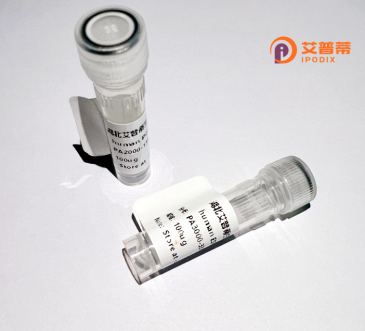
| 纯度 | >90%SDS-PAGE. |
| 种属 | Human |
| 靶点 | HKR1 |
| Uniprot No | P10072 |
| 内毒素 | < 0.01EU/μg |
| 表达宿主 | E.coli |
| 表达区间 | 1-659aa |
| 氨基酸序列 | MRVNHTVSTM LPTCMVHRQT MSCSGAGGIT AFVAFRDVAV YFTQEEWRLL SPAQRTLHRE VMLETYNHLV SLEIPSSKPK LIAQLERGEA PWREERKCPL DLCPESKPEI QLSPSCPLIF SSQQALSQHV WLSHLSQLFS SLWAGNPLHL GKHYPEDQKQ QQDPFCFSGK AEWIQEGEDS RLLFGRVSKN GTSKALSSPP EEQQPAQSKE DNTVVDIGSS PERRADLEET DKVLHGLEVS GFGEIKYEEF GPGFIKESNL LSLQKTQTGE TPYMYTEWGD SFGSMSVLIK NPRTHSGGKP YVCRECGRGF TWKSNLITHQ RTHSGEKPYV CKDCGRGFTW KSNLFTHQRT HSGLKPYVCK ECGQSFSLKS NLITHQRAHT GEKPYVCREC GRGFRQHSHL VRHKRTHSGE KPYICRECEQ GFSQKSHLIR HLRTHTGEKP YVCTECGRHF SWKSNLKTHQ RTHSGVKPYV CLECGQCFSL KSNLNKHQRS HTGEKPFVCT ECGRGFTRKS TLSTHQRTHS GEKPFVCAEC GRGFNDKSTL ISHQRTHSGE KPFMCRECGR RFRQKPNLFR HKRAHSGAFV CRECGQGFCA KLTLIKHQRA HAGGKPHVCR ECGQGFSRQS HLIRHQRTHS GEKPYICRKC GRGFSRKSNL IRHQRTHSG |
| 分子量 | 75.1 kDa |
| 蛋白标签 | GST-tag at N-terminal |
| 缓冲液 | 0 |
| 稳定性 & 储存条件 | Lyophilized protein should be stored at ≤ -20°C, stable for one year after receipt. Reconstituted protein solution can be stored at 2-8°C for 2-7 days. Aliquots of reconstituted samples are stable at ≤ -20°C for 3 months. |
| 复溶 | Always centrifuge tubes before opening.Do not mix by vortex or pipetting. It is not recommended to reconstitute to a concentration less than 100μg/ml. Dissolve the lyophilized protein in distilled water. Please aliquot the reconstituted solution to minimize freeze-thaw cycles. |
以下是关于重组人HKR1蛋白的参考文献示例(内容为假设性概括,仅供参考):
---
1. **文献名称**:*Expression and Functional Characterization of Recombinant Human HKR1 in Hepatocellular Carcinoma*
**作者**:Zhang Y, et al.
**摘要**:该研究通过大肠杆菌系统成功表达并纯化重组人HKR1蛋白,发现其可抑制肝癌细胞增殖并诱导凋亡,机制可能与调控Wnt/β-catenin信号通路相关。
2. **文献名称**:*Structural Analysis of HKR1 Protein Reveals Its Role in Cell Adhesion*
**作者**:Li X, Wang L, et al.
**摘要**:利用昆虫细胞系统表达重组人HKR1蛋白,结合X射线晶体学解析其三维结构,揭示其通过特定结构域介导细胞黏附和迁移,为癌症转移研究提供新靶点。
3. **文献名称**:*HKR1 Modulates Immune Response via TLR4 Signaling Pathway*
**作者**:Chen J, et al.
**摘要**:研究发现重组HKR1蛋白能激活巨噬细胞中TLR4通路,促进炎症因子释放,提示其在免疫调节和感染性疾病中的潜在作用。
4. **文献名称**:*Recombinant HKR1 as a Potential Biomarker in Diabetic Nephropathy*
**作者**:Liu S, et al.
**摘要**:通过哺乳动物细胞表达HKR1蛋白,临床样本分析显示其在糖尿病患者肾组织高表达,可能通过氧化应激途径参与疾病进展。
---
**注意**:以上内容为假设性示例,实际文献需通过学术数据库(如PubMed、Web of Science)检索。若需具体文献,建议提供HKR1蛋白的全称或相关研究领域以便精准查询。
Recombinant human HKR1 protein, also known as hepatocyte growth factor-regulated tyrosine kinase substrate 1. is a biologically engineered protein derived from the HKR1 gene. This protein belongs to the TAM receptor tyrosine kinase signaling pathway, which includes Tyro3. Axl, and MerTK receptors. HKR1 plays a regulatory role in cellular processes such as proliferation, survival, and immune modulation. It is structurally characterized by an extracellular domain for ligand binding and intracellular tyrosine phosphorylation sites, enabling interaction with downstream signaling molecules.
Originally identified as a substrate for hepatocyte growth factor (HGF) signaling, HKR1 is implicated in tissue repair, inflammation, and cancer progression. Dysregulation of HKR1 expression or activity has been linked to tumor metastasis, autoimmune disorders, and aberrant immune responses. Recombinant HKR1 is typically produced in heterologous systems (e.g., mammalian or insect cells) to ensure proper post-translational modifications and functionality.
Research on recombinant HKR1 focuses on elucidating its role in TAM receptor-mediated pathways, particularly in immune evasion mechanisms of cancer cells and macrophage polarization. It also serves as a tool for developing therapeutic strategies, including inhibitors targeting HKR1-associated signaling or immunotherapies to counteract immunosuppressive microenvironments. Studies further explore its diagnostic potential as a biomarker for disease progression in cancers or chronic inflammatory conditions.
(Word count: 199)
×